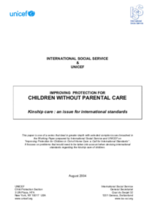Millions of children throughout the world are currently in, or in need of, out-of-home care because their parents are unavailable or unable to care for them:
-
In the USA there are 600,000 children in the foster-care system alone (CWLA);
-
Some 1.5 million children are reported to be in out-of-home care in Central and Eastern Europe and the CIS, including 900,000 in residential facilities (UNICEF);
-
In Africa, Asia and Latin America, some 9.5 million children whose parents have both died from HIV/AIDS are looked after by relatives or others in the community (UNAIDS);
-
Every year thousands of unaccompanied minors arrive as potential immigrants or asylum seekers in the industrialised countries: in 2001, they numbered over 17,000 (UNHCR).
Concern over the situation of children who cannot be looked after by their parents – and the provision of alternative care – is nothing new. In some settings, children in need of care are provided with little or none, as exemplified by children living on the street. States may also have difficulty in identifying or reaching some groups of children, including those associated with armed conflict or in situations of exploitative labour. More often, perhaps, foster and/or residential care is provided, but in ways which can violate children’s rights. Common concerns relate both to policies and practice in care settings and include physical, sexual and psychological abuse, lack of efforts towards family reunification and/or permanency, deprivation of liberty and overuse of residential care, among others.
The CRC provides an overall framework in which to raise these problems, but neither it nor other internationally-agreed texts set out comprehensive and detailed guidelines and rules that could clarify good practice, prevent abuses, and establish responsibilities and accountability. In calling for the development of such standards, this paper reviews the complex reality of care provision for children who are not looked after by their parents and seeks to identify the main problems and issues that need to be broached in an internationally-accepted instrument.
©UNICEF and International Social Service

